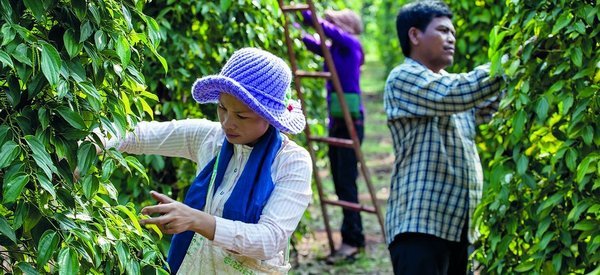- Share this article
- Subscribe to our newsletter
Designing foreign policy to support peasants and rural areas
Peasants provide immense services to the world such as through producing food and preserving biodiversity but suffer disproportionately from poverty and malnutrition and ongoing human rights violations such as eviction, political repression or poor working conditions. In recognition of this the 2018 UN General Assembly adopted the Declaration to protect the “Rights of Peasants and Other People Working in Rural Areas” (UNDROP).
Civil society groups, policy influencers and others are now working to put the articles of the Declaration into practice. In this context, the Swiss “Friends of the Declaration” coalition commissioned a study of Switzerland’s foreign policy to identify measures that can support or run counter to UNDROP, and to formulate recommendations as to how Switzerland should meet its UNDROP obligations.
The HEKS/EPER Land Forum
Drawing on the recommendations of the study, the HEKS/EPER Land Forum in December 2021 brought together a diverse group including parliamentarians, government officials, civil society and academics to identify concrete steps towards UNDROP implementation.
The Forum centred on (1) how to mainstream UNDROP as a key reference point for action (2) trade policy, including trade-related intellectual property protection for seeds and (3) food systems.
Key take-aways and recommendations
Recurrent themes throughout the day’s discussions were that peasants in the global North face many of the same challenges as those in the global South, national food policies are not just for agricultural ministries, and peasants play an important part in the world’s wellbeing through their crucial role in food production and stewardship of resources. Thus, democratic participation of peasants at all levels in shaping policies is crucial. Parliamentarians can also play a key role in ensuring that foreign policy is supportive of UNDROP.
Mainstreaming
The objective of mainstreaming UNDROP is to make it a reference point at the international level, to support domestic implementation around the world. The Declaration is gaining this status: human rights treaty bodies now regularly mention it as do Human Rights Council special procedures. Civil society groups in Switzerland are undertaking advocacy in the Human Rights Council towards creating a new special procedure wholly dedicated to peasants’ rights, with an event planned in spring 2022.
Trade, intellectual property and seeds
One of the main tensions lies in the Swiss government’s position on intellectual property (IP) and peasants’ rights to seeds. Elements considered at the Land Forum include the fact that Switzerland’s domestic seeds legislation and practice incorporate flexibilities supportive of peasants’ seed systems. Many voices called on Switzerland to desist from its practice of asking that countries with which it negotiates trade agreements join UPOV 1991 (the International Convention for the Protection of New Varieties of Plants), i.e. that trading partners adopt stricter IP standards than Switzerland. Some participants invited the Swiss Development Cooperation Agency to play a more active role in this area, for instance through providing technical assistance to countries on how to develop seed systems that recognize peasants’ seed systems.
On other aspects of trade policy, Land Forum participants noted that the international community is increasingly recognizing that agriculture needs support. Given its national measures in favour of peasants, participants put forward specific ways that Switzerland could work in the World Trade Organization (WTO) and the European Free Trade Area (EFTA) to recognize the need for safeguards and support for peasants’ agricultural products. A concrete step would be to improve understanding of UNDROP amongst WTO and EFTA negotiators. Another would be to strengthen and support peasants’ organisations and local authorities so as to improve their ability to participate in relevant trade and development policy decisions. Ex ante assessment of likely impacts of trade and development cooperation activities is also essential.
Food systems
Most actors agree that it is necessary to shift away from agriculture policies to food policies, and the importance of strengthening local, territorial food systems. Participants recognised the need for dialogue and a common understanding of what a sustainable food system looks like and what agroecology means. An existing power imbalance gives companies a defining power that should be balanced by equal cooperation between civil society, peasants, and private sector actors.
Environmentally and socially sustainable food systems cannot be built if peasants are dependent on companies and lack their knowledge and participation. The private sector cannot replace the responsibility of local or national authorities. Thus, strengthening States' ability to fulfil their obligations could be a way to hold private sector power in check. This includes setting clear criteria and conditions for collaboration with the private sector.
The Land Forum led to a clear action point which is to build a narrative to help governments understand the advantage of strengthening smallholder farming, such as the benefits for food security or for biodiversity conservation.
The Friends of the Declaration is a coalition of Swiss NGO s working for the implementation of UNDROP. The members are: Alliance Sud, Brot für alle, CETIM, Fastenopfer/AdC, FIAN, Geneva Academy, HEKS/EPER, Swissaid, Uniterre.
Caroline Dommen is an independent researcher on sustainability-related issues. She leads the Human Rights Economics Project and is a Senior Associate with the International Institute for Sustainable Development (IISD) Economic Law and Policy Programme.
More information:
The United Nations Declaration on the Rights of Peasants and Other People Working in Rural Areas is available in English, French and other languages.
The full study is available in French
Research briefs :
English
German
French
The HEKS/EPER Land Forum





Add a comment
Be the First to Comment